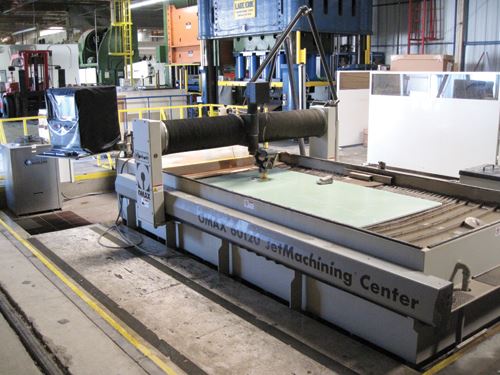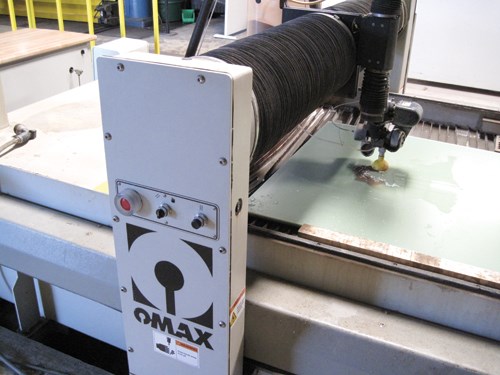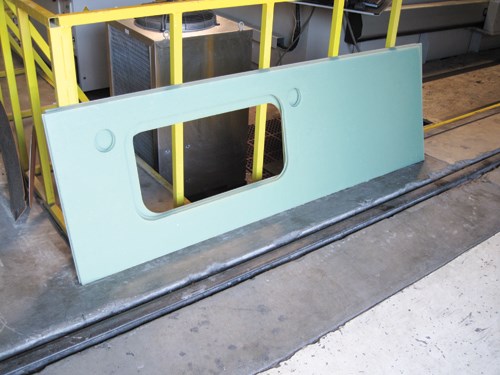Rail car doors: Waterjet cutter shapes panels with precision
When GFMI Aerospace & Defense (Fountain Valley, Calif.) was approached with the task of cutting hundreds of glass fiber/epoxy panels for use in the manufacture of rail car doors, it relied on a waterjet cutting system supplied by OMAX Corp. (Kent, Wash.).
As its name implies, GFMI Aerospace & Defense (Fountain Valley, Calif.) is accustomed to working with composites in high-performance applications, but occasionally it also handles the type of job that, although demanding, is targeted toward mass transportation markets. Such was the case recently when GFMI’s general manager, Adrian Corbett, was approached with the task of cutting hundreds of glass fiber/epoxy panels for use in the manufacture of train doors for a global passenger railcar manufacturer.
The doors, comprising two 7 ft by 2 ft (2.1m by 0.6m) panels that slide away from each other to allow passengers to get on and off the train, posed a challenge in that each one had to be cut to meet precise dimensions, before bonding to an aluminum exterior panel.
GFMI, says Corbett, chose as its standard raw material 5-mm/0.2-inch thick G10 glass fiber/epoxy panels provided by Interstate Plastics (Sacramento, Calif.), which measure 4 ft by 8 ft (1.2m by 2.4m). From each, GFMI would cut two door halves for one complete door. The question was how to cut them.
GFMI opted for waterjet cutting and has relied on its OMAX Corp. (Kent, Wash.) 60120, a 55,000-psi waterjet machine, to do the job. The company stacks four sheets on the machine’s cutting pedestal and cuts them simultaneously, starting with interior features first — cutouts for door handles and 15-inch by 30-inch (381 mm by 762 mm) windows — before cutting perimeter features.
Corbett says the waterjet process provides cleanly cut edges, with none of the dust associated with conventional composites machining. It takes GFMI about 3.5 hours to machine four sheets, then the company makes the windows and installs glass, bonds the composite to the aluminum and delivers the finished product to the customer for final assembly.
As of January 2013, GFMI had manufactured about 400 door sets, with “several more” sets on order
Related Content
-
Norco invests in CNC, kit cutting capability expansion
Transition from internal to external demand over the last few years has evolved Norco’s machining and composite kit cutting equipment, and now includes material outsourcing and digital engineering services.
-
From the CW Archives: Drilling is not for the faint of heart
This edition of From the CW Archives revisits CW’s first plant tour — a visit to the F-35 FAL in Fort Worth, Texas — and a story by Ginger Gardiner a few years later. Both offer lessons on how to perform stacked drilling through composite and metallic materials.
-
Queen’s University Belfast presents research in thermoplastic drilling performance optimization
Researchers have published findings from a multi-objective optimization study on carbon fiber-reinforced PEKK drilling in an effort to better understand the material for use in aviation fastenings.



















